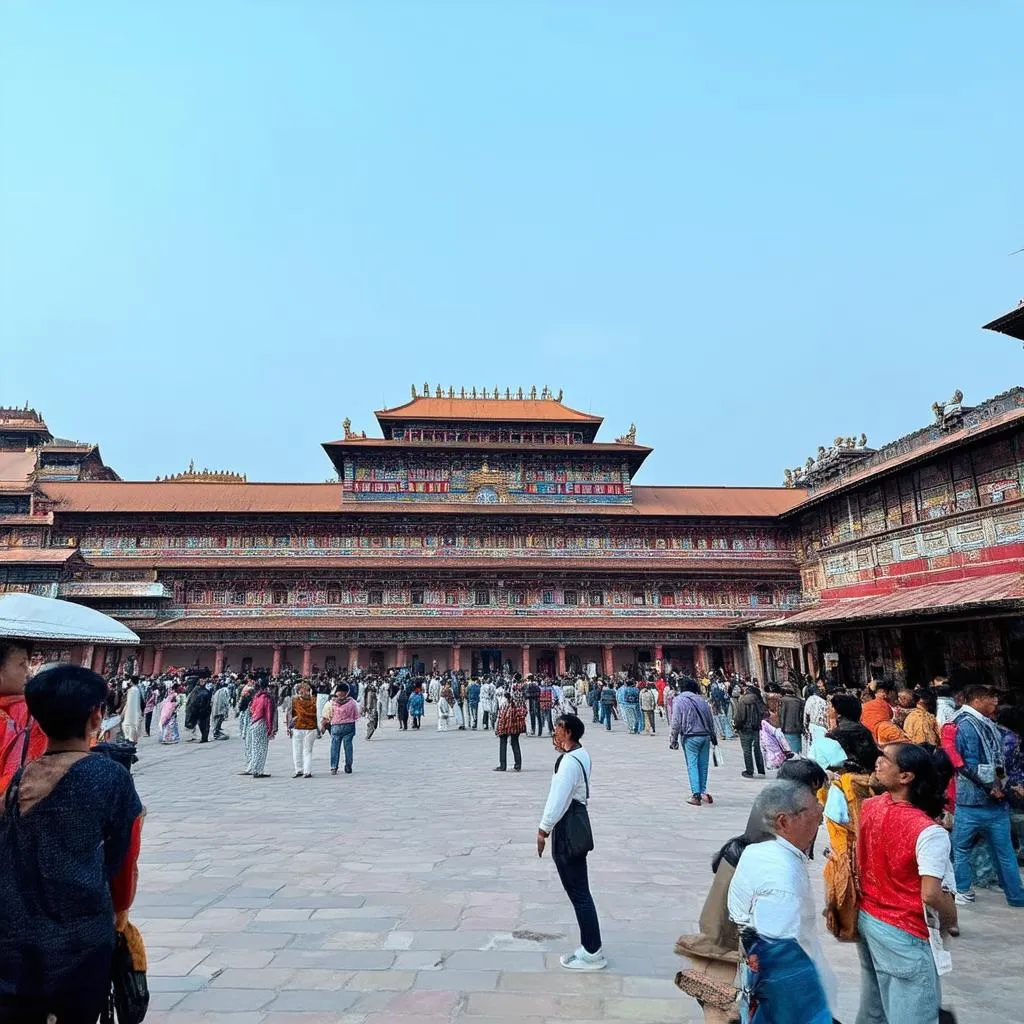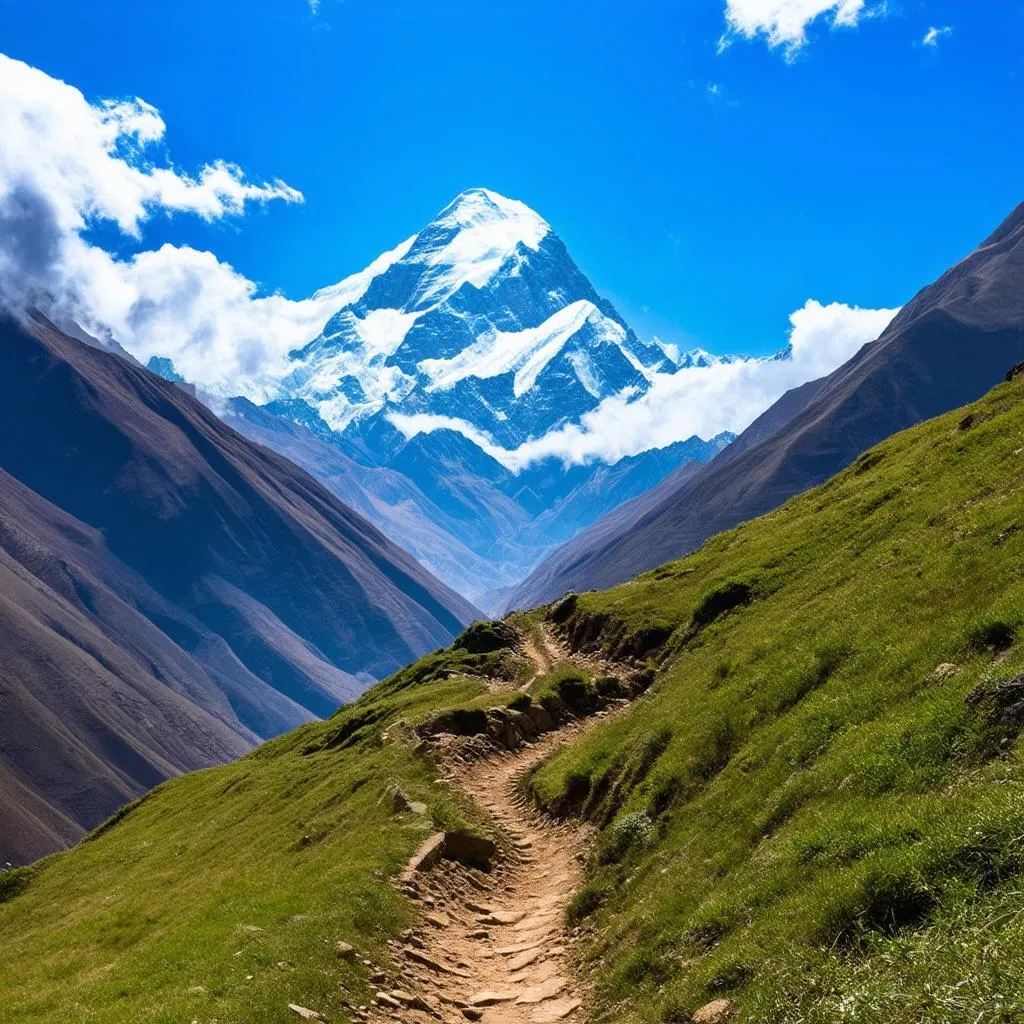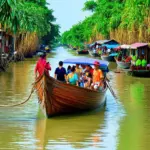Have you ever dreamt of standing at the foot of towering mountains, their snow-capped peaks piercing the sky? Or trekking through lush green valleys, vibrant prayer flags fluttering in the wind? Nepal, the land of the Himalayas, calls to adventurers and spiritual seekers alike. And what better way to answer that call than through backpacking, immersing yourself in its rich culture and breathtaking landscapes?
Unveiling the Magic of Backpacking Nepal
Nepal offers a unique blend of adventure and spirituality. Imagine navigating bustling Kathmandu, its ancient temples and vibrant markets a sensory overload in the best possible way. Picture yourself trekking through rhododendron forests, the air thick with the scent of pine and earth as you ascend towards the Annapurna Base Camp.
Why choose backpacking? It’s about freedom, flexibility, and affordability. It’s about connecting with locals, experiencing authentic Nepal, and creating memories that will last a lifetime.
Planning Your Backpacking Adventure
Choosing the Right Time
- Spring (March-May): Rhododendrons are in bloom, the weather is pleasant, and the views are stunning.
- Autumn (September-November): Post-monsoon season offers clear skies and comfortable temperatures, perfect for trekking.
- Monsoon (June-August): While lush and green, trekking can be challenging due to rain. Lower elevation treks are still possible.
Budgeting Your Trip
Nepal is extremely budget-friendly. You can easily get by on $20-30 per day, including accommodation, food, and transportation.
- Accommodation: From budget guesthouses to tea houses on trekking routes, options are plentiful.
- Food: Indulge in delicious and affordable Nepali staples like dal bhat (lentil soup and rice) and momos (dumplings).
- Transportation: Local buses are the cheapest option, while tourist buses offer more comfort.
Packing Essentials
- Backpack: A comfortable and durable backpack (50-60 liters) is crucial.
- Trekking gear: Depending on your chosen trek, pack appropriate footwear, layers of clothing, a rain jacket, and a water bottle.
- Essential documents: Passport, visa, trekking permits, and travel insurance are mandatory.
Must-Do Experiences in Nepal
Trekking to New Heights
- Everest Base Camp Trek: A once-in-a-lifetime experience, trekking to the base of the world’s highest peak is challenging yet rewarding.
- Annapurna Base Camp Trek: Offering diverse landscapes and stunning mountain views, this trek is perfect for both beginners and experienced trekkers.
- Langtang Valley Trek: Less crowded than the Everest or Annapurna regions, this trek boasts breathtaking scenery and cultural encounters.
Immersing in Culture and History
- Kathmandu: Explore ancient temples like Pashupatinath and Boudhanath, wander through the vibrant Thamel district, and discover hidden courtyards.
- Bhaktapur: Step back in time in this well-preserved medieval city, famous for its pottery and traditional architecture.
- Pokhara: Relax by the serene Phewa Lake, with stunning views of the Annapurna range, and enjoy the lakeside ambiance.
 Kathmandu Durbar Square
Kathmandu Durbar Square
Feng Shui and Your Journey
In Feng Shui, travel is considered an excellent way to enhance your luck.
- Choosing a destination aligned with your aspirations: Traveling south (the direction of fame and recognition) might be beneficial if you seek inspiration.
- Packing items in auspicious colors: Consider including colors like red (for good luck) or green (for growth and new beginnings) in your travel gear.
Remember, these are simply beliefs and should be taken with a grain of salt. The most important aspect is to approach your journey with an open heart and mind.
Common Questions About Backpacking Nepal
Q: Is it safe to travel alone in Nepal?
A: Nepal is generally safe for solo travelers, especially women. However, it’s always wise to take precautions, such as informing someone of your whereabouts and avoiding walking alone at night.
Q: Do I need to hire a guide for trekking?
A: While not mandatory for all treks, hiring a guide can enhance your experience, especially for challenging routes. They offer valuable local knowledge, navigation assistance, and cultural insights.
Q: What should I do about altitude sickness?
A: Acclimatize properly by ascending gradually, staying hydrated, and consuming a balanced diet. Diamox, a medication for altitude sickness, can be obtained with a prescription.
Embrace the Adventure
Backpacking Nepal is an immersive experience, a journey that challenges and rewards in equal measure. It’s about pushing boundaries, embracing the unexpected, and discovering the beauty of simplicity. So, pack your bags, book your flights, and get ready for an adventure of a lifetime in the heart of the Himalayas.
 Annapurna Circuit Trek
Annapurna Circuit Trek
Want to learn more about backpacking destinations around the world? Explore insightful resources and travel tips on TRAVELCAR.edu.vn.

